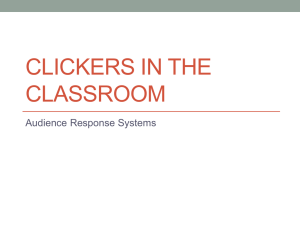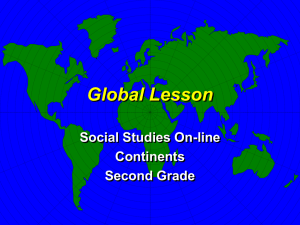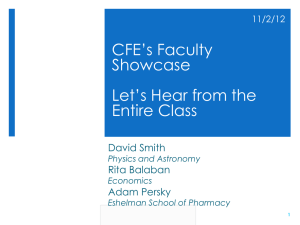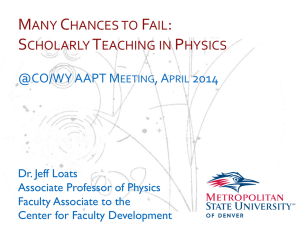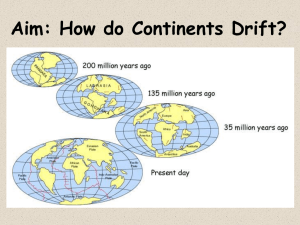Using Clickers in Large Classes
advertisement
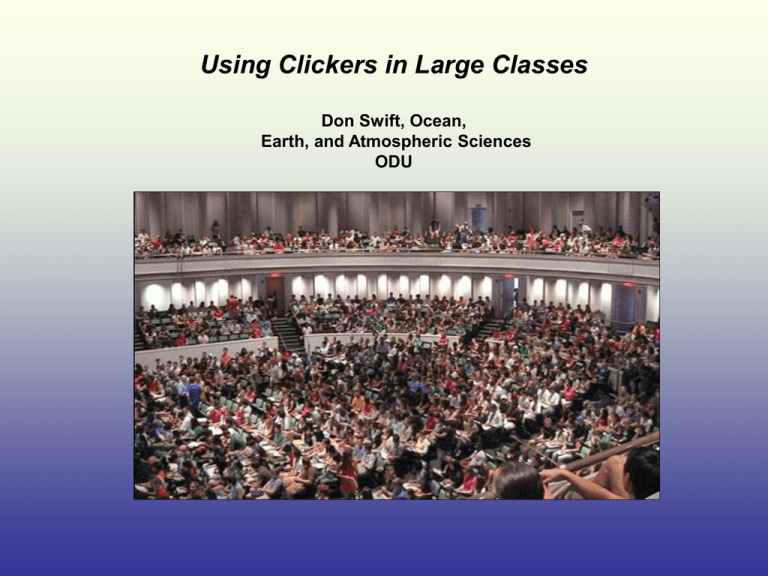
Using Clickers in Large Classes Don Swift, Ocean, Earth, and Atmospheric Sciences ODU My Experience I teach OEAS 106N, Introductory Oceanography. It’s a Gen Ed course, populated largely by people who need a science course to get their degree. I have 385 students in one section, and when I am through with them I have 180 more in the second session, an hour later. Oceanography at the introductory Level is an “information-rich” subject. I can’t keep them busy working problems. . The Course Welcome! Welcome to OEAS 106 introductory Oceanography. Course Content Students can work simple problems in lab, but lecture is just that- lecture. Students have referred to it as “drinking from a fire hose.” Large classes and Crowd control When I first heard about clickers, I immediately thought of them in terms of crowd control. When you have several hundred young people packed in shoulder to shoulder the “titter threshold” as my colleague phrased it, is pretty low. But I can cite some pedagogical advantages also. The clicker System Old Dominion University presently has a contract with Turning Point technologies. Their clicker system consists of a“response card,” about the size of a playing card, with an alphanumeric keyboard and an LCD screen, Each student pays about $35 for one at the bookstore. Instead of the mobile receiver shown here, there is a receiver bolted into the podium in my lecture hall. Here is a typical question slide. Clicker Quiz Alfred Wegener’s evidence for continental drift included all but: 1. Pattern-matching of geologic rock types across continents. 2. Pattern-matching of paleoclimate zones across continents. 3. Pattern-matching of volcanoes across continents. 4. Pattern-matching of the ranges of fossils across continents. 90 77% 20% 2% 1 2 1% 3 4 Question Slides About halfway through the lecture, at some logical break in Its continuity the students have to answer the first question. Clicker Quiz Alfred Wegener’s evidence for continental drift included all but: 1. Pattern-matching of geologic rock types across continents. 2. Pattern-matching of paleoclimate zones across continents. 3. Pattern-matching of volcanoes across continents. 4. Pattern-matching of the ranges of fossils across continents. It is based on what they have heard in the last 25 minutes. They get 2 points for the right answer, and 1 point for a wrong answer (attendance point). 90 77% 20% 2% 1 2 1% 3 They must answer a second question at the end of the Lecture. Their clicker average is 20% of their final grade, so their have an incentive to 1) show up, 2) pay attention, and 3) stay to the end. The students get the slide set in advance of the lecture. They can downloadfit from Blackboard- without the two quizzes. I sometimes re-use the questions on exams. 4 Software The University dropped the company that we used last year, because it was bought out, and the new owner dropped clickers. The new software is distinctly less user friendly than last year’s version. But there is one distinct advantage:The student’s scores download smoothly into the blackboard gradebook Conclusions It is still an ongoing experiment At present I am getting an unacceptably high number of no-scores on the clicker quizzes At first I blamed it on my having to learn new software. Now I am blaning on the student’s slow learning curve for clicker use. It is also possibly a software issue. I am getting good support from university technical people- despite the fact that they are stretched very thin.
